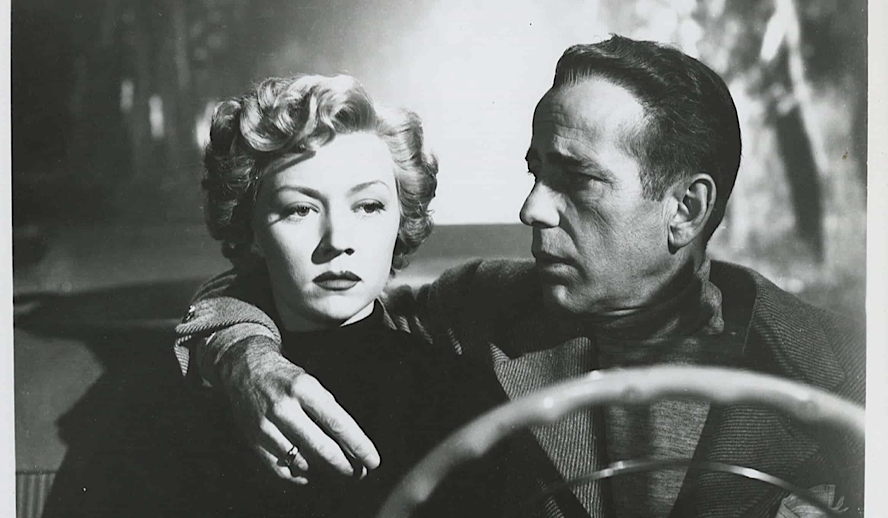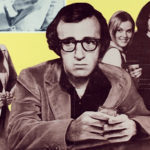Table of Contents

Photo: ‘In a Lonely Place’
A Novel, a Man, a Woman, a Murder
‘In a Lonely Place’ was released in 1950, deep into the era of the classic film noir, when the Golden Age of Hollywood was at its brightest; TV had not yet become popular enough to present an existential threat to movie theaters, and some of the finest filmmakers and actors were still very much active — and producing some of their best work.
Related Video: Full Commentary on ‘Top Gun: Maverick’: Tom Cruise, Val Kilmer, Jennifer Connelly, Miles Teller
Related video: ‘Top Gun: Maverick’ Full Premiere Reactions: Tom Cruise, Val Kilmer, Jennifer Connelly, Miles Teller
Related video: EVOLUTION: Every Tom Cruise Role From 1981 to 2021, All Performances Exceptionally Poignant
The film was directed by Nicholas Ray, a rebel with a cause whose films consistently did poorly at the box office (with the exception of ‘Rebel Without a Cause’), making his stay in Hollywood a short one. But ‘In a Lonely Place’ was Ray’s fourth feature, and he still had a decade’s worth of classics, including ‘Johnny Guitar’, ‘Bigger Than Life’, and the aforementioned ‘Rebel Without a Cause’ ahead of him. The screenplay was written by Andrew P. Solt, adapted loosely from Dorothy B. Hughes’s novel of the same title (itself now considered a classic crime thriller), and the film would take several liberties with the source material — most notably the ending, which is quite different.
The film starts with our anti-hero, Dixon Steele, getting into a fight with a fellow driver at a stoplight, and within the first five minutes, we’re given a great deal of insight into what kind of a man Dix is: he’s short-tempered, aggressive, fearless, and yet deeply melancholy. Dixon is a screenwriter — albeit a failed one at this point; he has not penned a script since before World War II (the film presumably takes place in the late 1940s), and it seems that his wartime experiences invoked a stupor.
Related article: A Tribute to Johnny Depp: The Actor and Musician Who Defined Range
Related video: EVOLUTION: Every Johnny Depp Role From 1984 to 2020, All Performances Exceptionally Poignant
Related article: A Tribute to the Hero & President Volodymyr Zelenskyy: Comedian/Actor, Ukraine’s President and Heroic Leader
Finally, Dix’s agent all but forces him to adapt a novel he hasn’t read into a screenplay, partly to get Dix working again and partly because his agent (who is also a longtime friend of his) feels sorry for him. Dix can’t be bothered to read the book himself, so he has Mildred, a nice and unassuming young woman, recap the whole thing for him at his apartment. The two get along well, although the book sounds like hack work, and Dix pays for Mildred’s cab fare at the end of the night. All seems well, until Dix gets a rude awakening the next morning: Mildred has been murdered, and authorities think he did it.
‘In A Lonely Place’ – Pushing the Classic Film Noir to Its Limits
The idea of a film noir protagonist being accused of the crime they’re investigating is not new, and I suspect it wasn’t even all that fresh when ‘In a Lonely Place’ was released. There is always the unspoken rule, however, that the protagonist is not the one who had committed the crime; there are a couple of exceptions I can think of, but even with these, the murderer-masquerading-as-investigator tries at least somewhat to come off as sympathetic.
Related video: Full Premiere Reactions ‘Doctor Strange in the Multiverse of Madness’: Benedict Cumberbatch & Team
Related Video: OSCAR-NOMINATED – EXCLUSIVE: ‘Dune’ Full Commentary, Reactions, Making Of – Timothee Chalamet, Zendaya, Oscar Isaac
Related Video: OSCAR-NOMINATED – ‘House of Gucci’ Full Commentary & Behind the Scenes – Lady Gaga, Adam Driver, Jared Leto, Al Pacino
With Dixon Steele, however, we’re given a character who very well could have committed the crime he is suspected of committing; Dix is such a loose cannon that on top of the assault we know he commits, he could also feasibly be a murderer. It doesn’t help either that Dix is anti-social and deeply unpleasant; he is not what we would call a “good” person. I’m reminded of Ben Affleck’s character in ‘Gone Girl’, who, regardless of his innocence regarding the kidnapping of his wife, is proven to be a despicable human being. Dix is a more likable character, if only because he is clearly haunted by past traumas and in a near-constant state of misery, but to say he’s an anti-hero would be underselling it.
Related article: EVOLUTION: Every Henry Cavill Role From 2001 to 2021, All Performances Exceptionally Poignant
Related article: EVOLUTION: Every Chris Evans Role From 1997 to 2020, All Performances Exceptionally Poignant
Related article: #metoo Revolution: Powerful Questions That Need Answers
Related article: FACT-CHECKED Series: Timothee Chalamet and 32 Facts about The Young Superstar
Another peculiar thing ‘In a Lonely Place’ does is all but forget about the crime at the center of its plot. When being questioned about the part he played on that fateful night, Dix is properly introduced to Laurel (played by Gloria Grahame), a fellow tenant who had also witnessed Mildred leaving Dix’s apartment. The two hit it off remarkably quickly, and yet while in most movies with fast-moving romances the relationship strains the viewer’s suspension of disbelief, it makes perfect sense for someone like Dix to fall fast and hard in love like this; he’s the kind of guy who would propose to an “escort” while getting smashed in Vegas. Their relationship is at first rosey, but soon falls prey to Dix’s demons rising to the surface once again.
The film starts out as a typical (if remarkably cynical) crime thriller before evolving into a tragic love story, as the focus shifts from the murder case to the romance. Once again, this is a move that would sink lesser films, but we’re given extra perspective on Dix’s character by being anchored in Laurel’s; she becomes the relatable character, the one most normal in behavior, and the one most vulnerable to Dix’s outbursts.
Related article: MUST WATCH – The Hollywood Insider’s CEO Pritan Ambroase’s Love Letter to Black Lives Matter – VIDEO
Subscribe to The Hollywood Insider’s YouTube Channel, by clicking here.
Humphrey Bogart’s Most Tragic Performance
I’m not sure how movie buffs my age feel about the old stars from Hollywood’s Golden Age. James Dean’s appeal seems eternal, and Marilyn Monroe has in recent years been evaluated as not only a capable actress but a deceptively intelligent woman, but I would wager that most of the former big shots are now remembered as caricatures — if remembered at all. Humphrey Bogart is simultaneously one of the most recognizable and underappreciated actors of his era; he gives a super-iconic performance in ‘Casablanca’ and would win an Oscar for ‘The African Queen’, but he keeps being pigeonholed as a stoic tough guy. Of course, Dixon Steele is very much a tough guy, but he’s far from stoic.
Limited Time Offer – FREE Subscription to The Hollywood Insider
The role of Dixon Steele feels like both a deconstruction of the parts Bogart often played (which, even by 1950, he must have surely been getting tired of) and such a part played to its logical extreme. Not only is Dix violent, but his violence is all but indiscriminate; he risks alienating every other character in the movie, from his agent to his buddy in the police department to his love interest. Violence not so much defines as bleeds into every aspect of Dix’s life, and while most movies with violent anti-heroes would have the anti-hero come out right in the end, despite his faults, Dix’s penchant for violence utterly ruins his life. I won’t spoil the film’s ending, nor the book’s ending, but I will say the change resulted in (to me, anyway) a more emotionally impactful conclusion, not least because Dix is not irredeemable; he comes close, though.
Related article: The Hollywood Insider’s CEO Pritan Ambroase: “The Importance of Venice Film Festival as the Protector of Cinema”
Related article: The Masters of Cinema Archives: The Hollywood Insider Pays Tribute to ‘La Vie En Rose’, Exclusive Interview with Director Olivier Dahan
Related article: – Want GUARANTEED SUCCESS? Remove these ten words from your vocabulary| Transform your life INSTANTLY
Surviving Hollywood’s Heart of Darkness
1950 was, rather inexplicably, a watershed year for super-pessimistic movies about Hollywood; along with ‘In a Lonely Place’, we had Billy Wilder’s ‘Sunset Boulevard’ and Joseph L. Mankiewicz’s ‘All About Eve.’ ‘In a Lonely Place’ and ‘Sunset Boulevard’ are film noirs, which take typical film noir structures and tropes and turn them on their heads, while ‘All About Eve’ is closer to a character drama. All three movies are remarkably vicious, at a time when censorship in the industry was tight, but for me, ‘In a Lonely Place’ hits the hardest because it is also the most vulnerable and the most romantic. Nicholas Ray was, along with fellow filmmakers Douglas Sirk and Joseph L. Mankiewicz, a crafter of subversive melodramas in the 1950s; his films were often heightened, hysterical, more than a little contrived, and yet unrelenting in their takedowns of Hollywood expectations. The nuclear family gets torn apart by drug abuse in ‘Bigger Than Life’, the post-World War II generation is doomed by the sins of the previous generation in ‘Rebel Without a Cause’, and in ‘In a Lonely Place’, the old-school Hollywood tough guy comes out as a destroyer, rather than a savior.
‘In a Lonely Place’ is currently available to stream on Prime Video and Tubi.
By Brian Collins
Click here to read The Hollywood Insider’s CEO Pritan Ambroase’s love letter to Cinema, TV and Media. An excerpt from the love letter: The Hollywood Insider’s CEO/editor-in-chief Pritan Ambroase affirms, “We have the space and time for all your stories, no matter who/what/where you are. Media/Cinema/TV have a responsibility to better the world and The Hollywood Insider will continue to do so. Talent, diversity and authenticity matter in Cinema/TV, media and storytelling. In fact, I reckon that we should announce “talent-diversity-authenticity-storytelling-Cinema-Oscars-Academy-Awards” as synonyms of each other. We show respect to talent and stories regardless of their skin color, race, gender, sexuality, religion, nationality, etc., thus allowing authenticity into this system just by something as simple as accepting and showing respect to the human species’ factual diversity. We become greater just by respecting and appreciating talent in all its shapes, sizes, and forms. Award winners, which includes nominees, must be chosen on the greatness of their talent ALONE.
I am sure I am speaking for a multitude of Cinema lovers all over the world when I speak of the following sentiments that this medium of art has blessed me with. Cinema taught me about our world, at times in English and at times through the beautiful one-inch bar of subtitles. I learned from the stories in the global movies that we are all alike across all borders. Remember that one of the best symbols of many great civilizations and their prosperity has been the art they have left behind. This art can be in the form of paintings, sculptures, architecture, writings, inventions, etc. For our modern society, Cinema happens to be one of them. Cinema is more than just a form of entertainment, it is an integral part of society. I love the world uniting, be it for Cinema, TV. media, art, fashion, sport, etc. Please keep this going full speed.”
More Interesting Stories From The Hollywood Insider
– Want GUARANTEED SUCCESS? Remove these ten words from your vocabulary| Transform your life INSTANTLY
– A Tribute to Martin Scorsese: A Complete Analysis of the Life and Career of the Man Who Lives and Breathes Cinema
– Do you know the hidden messages in ‘Call Me By Your Name’? Find out behind the scenes facts in the full commentary and In-depth analysis of the cinematic masterpiece
– A Tribute To The Academy Awards: All Best Actor/Actress Speeches From The Beginning Of Oscars 1929-2019 | From Rami Malek, Leonardo DiCaprio To Denzel Washington, Halle Berry & Beyond | From Olivia Colman, Meryl Streep To Bette Davis & Beyond
– In the 32nd Year Of His Career, Keanu Reeves’ Face Continues To Reign After Launching Movies Earning Over $4.3 Billion In Total – “John Wick”, “Toy Story 4”, “Matrix”, And Many More
In a lonely place, In a lonely place, In a lonely place, In a lonely place, In a lonely place, In a lonely place, In a lonely place, In a lonely place, In a lonely place, In a lonely place, In a lonely place, In a lonely place, In a lonely place, In a lonely place, In a lonely place, In a lonely place, In a lonely place, In a lonely place, In a lonely place, In a lonely place, In a lonely place









